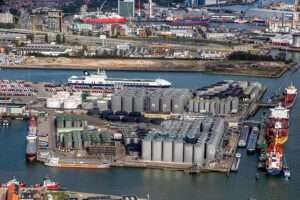GCMD concludes biofuels supply chain trials

This marks the end of a series of trials initiated in July 2022 as part of a larger pilot to develop a framework to provide quality, quantity and GHG abatement assurances for drop-in fuels.
In this final trial, bp provided the B30 biofuel blend to the TIHAMA, a 19,870 twenty-foot equivalent unit (TEU) container vessel operated by Hapag-Lloyd.
The biofuel component used is certified to the International Sustainability & Carbon Certification (ISCC) standard – a multistakeholder certification scheme for biobased materials. The biofuel component comprised neat Fatty Acid Methyl Ester (FAME) produced from food waste.
Authentix, a tracer solutions provider, supplied and dosed the FAME with an organic-based tracer at the storage terminal outside the Netherlands. The dosed FAME was then transported to the Port of Rotterdam for blending with VLSFO to achieve a B30 blend, before the blend was bunkered onboard the TIHAMA.
Similar to previous trials, GCMD engaged fuel testing company Veritas Petroleum Services (VPS) to witness the operations at all stages – from biofuel cargo transfer to bunkering. VPS also collected and conducted extensive laboratory tests on samples of the biofuel and biofuel blend collected at pre-determined points along the supply chain to assess quality per Standards EN 14214 and ISO 8217.
With well-to-wake emissions of 13.74 gCO2e/MJ, the neat FAME presented a 85.4% emissions reduction compared to the emissions of the fossil marine fuel. The reduced emissions complies with the MEPC 80, which requires a minimum emissions reduction of 65% in order for biofuels to be classified as sustainable.
GCMD and Hapag-Lloyd determined that consumption of the 4,500 MT B30 blend of FAME and VLSFO resulted in 27.9% emissions reduction compared to sailing on VLSFO.













